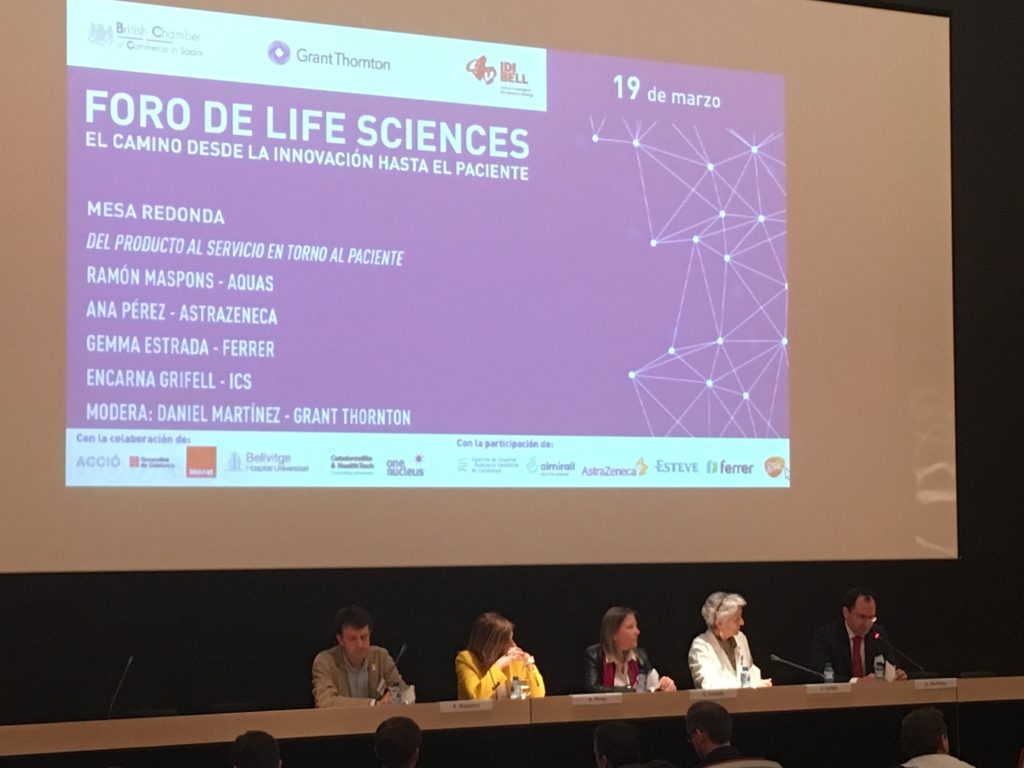The event gathered the main innovation experts in Catalonia and analyzed the synergies with the same industry in the United Kingdom
The Foro Life Sciences gathered for a day the best experts and companies in the life sciences field, with the aim to put into value the industry in Catalonia and strengthen its relationship with the United Kingdom. The event took place last Tuesday 19th, March 2019 in the Bellvitge University Hospital, and was organized by the Bellvitge Biomedical Research Institute (IDIBELL), the British Chamber of Commerce in Spain and the consulting company Grant Thornton.
During the sessions, the speakers expressed the need of boosting and strengthening the access to innovation, properly identifying trends, challenges and opportunities in the development and the offer of services to the patient. Besides, experts showed when it comes to searching for new business opportunities for the sector in UK.
Relationship between United Kingdom and Spain in health sector
Due to the current political context of the UK and the great importance of the bilateral commercial relationships between Spain and the UK in terms of life sciences, the event was very useful for the guidance of both, companies and institutions. “The life science sector is one of the pillars in the British economy; it contributes with 70,000 million pounds on the GDP and generates more than 270,000 job positions”, explained Tony Jones, CEO of One Nucleus, the organization that gives support to institutions and companies of the sector. The United Kingdom has the most important biotechnological cluster in the world after the US.
“Spain can learn a lot from the UK and vice-versa” said Christopher Dottie, president of the British Chamber of Commerce. “That’s why we need to keep working hand in hand”, added.
Innovation in Catalonia and Spain
The life sciences ecosystem brings together a great number of innovation agents. Jordi Naval, Managing Director of BIOCAT, says that “in Barcelona one can witness cutting-edge institutions and companies that innovate every day, right next to us”.
Furthermore, in his speech, Naval emphasized that “in the last 5 years we have multiplied by ten the number of international investors in life sciences in Catalonia”. However, Raquel Egea, head of Technology Transfer and Innovation at IDIBELL, argued that “we must consolidate relationships with the United Kingdom and strengthen the Catalan corporate tissue if we want to keep being competitive in Europe”.
Migration of innovation
Another topic during the event was the role that the Administration plays in the management of innovation. For example, Luis Cordero, Corporate Affairs and Market Access Director at AstraZeneca mentioned the fast development pace taking place in Spain in terms of innovation and research, which is allowing different actors to recognize their shared value and to be inclined to analyze different funding models. “We find ourselves in the perfect storm: never before did we have so much innovation and, at the same time, so little resources to allocate to innovation”, added Jorge Vázquez, Pricing & Government Affairs Manager in ESTEVE.
Martin Schuchardt, Global Market Access Lead in Almirall, reflected on the topic. “We need to decide which kind of country we want to be: an innovation-generator country or an innovation-buyer country”.
The Administration setbacks
Another point for debate that was present in the roundtables was the different obstacles that companies encounter. Guillermo de Juan Echávarri, Corporate Affairs and Communication Director at GSK for Spain, Israel and Portugal, claimed that there is a need for a more homogeneous and stable scenario. “The implication of the administration is high, but this is not an easy path. We have — in Spain — a complex funding system with different regions and entities. We need much clearer regulatory processes, without any contradictions between them. The Administration must reduce the complexity that companies face, so it does not take a toll on the patient”.
Gemma Estrada, Digital Health and Technology Director at Ferrer, summarized that “in order to keep going, it is very important to come up with new funding models and strategies, since our current fundung system is still rooted in the past”. Along the same line, Alejandro Martínez Borrell, president at Grant Thornton, pointed out that “only a coordinated intervention between the different agents of the sector, can contribute to a high-quality system that is sustainable through time”.
The dialogue between the public and private sector
Ana Pérez, Medical & Regulatory Affairs director of AstraZeneca added that “innovation cannot be at the expense of the patient. We need to achieve a sustainable system that gives results to patients and society”. In this sense, Jose Antonio Hernández, Healthcare & Life Sciences Partner at Grant Thornton, noted that “evolution towards a system based on creating value is a key aspect to sustainability and implies a transformation in how health institutions and industry interact”.
“A good relationship between the public and private agents is required, beyond negotiations. There has to be a constant dialogue to promote a system focused on the generation of value”, stressed Encarna Grifell, director of Strategic Planning, Innovation and Assessment in of the South Metropolitan Territorial Management. “Besides, the Administration must be aware that there is no innovation at zero risk”, concluded.
For Ramon Maspons, responsible of innovation at AQuAS, the new mechanisms of collaboration between the two sectors – public and private- are a powerful tool, but “it is important to keep in mind what we mean by value and what strategy we follow”. Hence, he pointed out that it is necessary to determine “if we want to buy what we want and look for products or we want to buy what we need and look for solutions”.
To sum up, investing more and better in health, more collaboration and dialogue between the public and private sectors and promoting innovation in all their fields as a key for the future, were the main highlights of the Foro Life Science, which opens new horizons for debate in the managing of health sciences, at a national and international scale.

